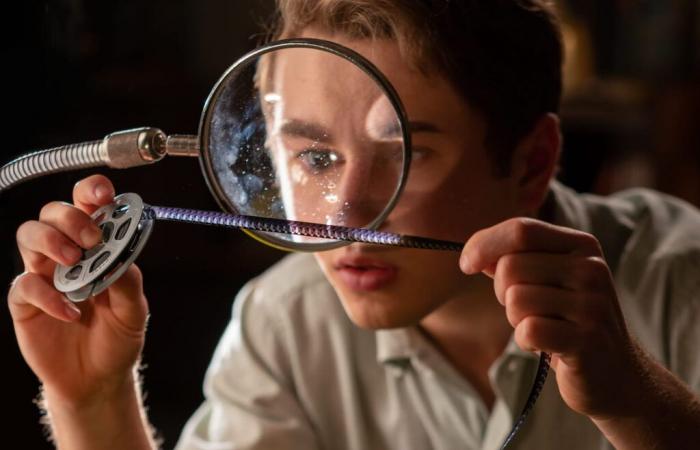
In this filmed autobiography released on February 22, 2023, Steven Spielberg opens up like never before and recounts his discovery of cinema and the separation of his parents.
Steven Spielberg’s cinema has shaped the imagination of many moviegoers. Of Jurassic Park has Indiana Jonespassing through E.T., Minority Report, Jaws or even Schindler’s Listthe 76-year-old director has created some of the biggest films of recent years and remains one of the most prolific filmmakers of his generation. For the first time, he tells himself: The Fabelmans was the big cinema release on February 22, 2023. Spielberg looks back on his personal development from the ages of 6 to 17, marked by the slow separation of his parents and his development as a filmmaker fascinated by images.
The filmmaker chose to distance himself by changing the names of his characters, who became “The Fabelmans” and not the “Spielbergs”. But The Fabelmans tells in a very personal way the childhood of Steven Spielberg, with events inspired by his own story: his discovery of cinema, his daily life with his sisters (they did indeed have a pet monkey), the anti-Semitism which he was a victim, his meeting with John Ford, but above all the divorce of his parents after they left Arizona for California.
Like in the movie, his mother, Leah Adler, fell in love with her husband’s best friend, Bernie Adler. The couple eventually got married, as can be seen in the film. Steven Spielberg discovered his mother’s affair when he was 16 and kept it a secret. On the other hand, contrary to what The Fabelmans shows, Steven Spielberg was unaware of the reasons that led his parents to divorce, when he was 19 years old.
In a documentary on the filmmaker released in 2013, Arnold Spielberg says he took responsibility for this separation to “protect” his wife. As a result, Steven Spielberg resented his father for 15 years and did not speak to him for many years: “I never told him that I was angry with him, the filmmaker recalls, I never had one word louder than the other, but I put a distance between us.” But this conflicting father-son relationship has peppered the work of the director, Encounter of the Third Kind has E.T., passing through Indiana Jones and the Last Crusade. On the other hand, her parents remained very close until the death of Leah Adler in 2017.
This film being highly personal, Steven Spielberg waited until his parents died before starting work on the feature film. His father, Arnold Spielberg, died in August 2020, his mother, Leah Adler, died in 2017. The global coronavirus outbreak was also a creative catalyst for the director: “As the health situation worsened, I wondered what I would like to leave behind me and what central issue I absolutely wanted to tackle”, we can read on Allociné. He then wrote the screenplay with Tony Kushner, a playwright and writer with whom he also thought Munich, Lincoln et West Side Story.
Synopsis – Sammy Fabelman grew up in Arizona in the 1950s and 1960s. He fell in love with cinema after discovering The Greatest Show on Earth. With his camera, the young man began to create his own films at home and dreamed of becoming a director. He then discovers shocking family secrets, while he watches his parents’ couple fall apart. Directed by Steven Spielberg, the film is inspired by the filmmaker’s youth.
In 2h31, which we almost don’t see go by, Steven Spielberg takes us emotionally into his childhood memories. The Fabelmans is, without a shadow of a doubt, one of his most personal works, in which he expresses everything accurately and without ever falling into pathos: the anti-Semitism he may have suffered as a teenager, the American dream pursued by his father, his relationship with his parents and his sisters but, above all, the pain of a child who sees his united family disintegrate. Paul Dano (The Batman, Little Miss Sunshine) and Michelle Williams (Dawson, Blue Valentine) here embody the Fabelmans parents and prove to be touchingly sincere. The troublemaker Seth Rogen is astonishingly tender here and delivers perhaps one of his best scores.
Steven Spielberg talks about his cinema
Beyond personal exposure, The Fabelmans is a real love letter to cinema. Not an ode to his history and to these films which shaped his cinephile, or, in any case, not only that. Steven Spielberg returns here to his discovery of the power of the image, the way in which it tells a story, transforms it or reveals hidden truths. The name of this family, which directly evokes the world of the fable, is thus evocative of the subject of the film. For the first time, Spielberg dissects his cinematic language and its codes, thus revealing himself as no director had been able to do before. A filmmaker of visual metaphor, served by the superb soundtrack by John Williams, Spielberg uses his unrivaled talent as a storyteller to confront us with our own relationship with cinema. Following in the footsteps of this young man who, we know, will become one of the most prodigious directors of his generation, is all the more exhilarating.
The French press is rave about The Fabelmans. On the Allociné review aggregator, the average press rating is 4.9/5 for 41 press titles listed, a rating rarely achieved by films. It is “a very great film” for the specialized media Cinemateaser, an “already unforgettable” feature film for Elle, “one of Spielberg’s most beautiful” films for Le Figaro, a “masterful” feature film and moving” for Télérama, or even “a magnificent autobiographical story” according to Le Parisien. A faultless one, in short.
In the United States, the film The Fabelmans is also acclaimed. The international review aggregator Rotten Tomatoes has certified the film as “fresh”, since it has a rating of 92% positive opinions out of 362 reviews recorded. From the public side, it is also a success: the feature film received 83% positive reviews from spectators out of more than 1000 verified reviews. However, The Fabelmanswhich also received the Golden Globe for best dramatic film and that of best direction, was a failure at the American box office: from November 25, 2022 to January 2, 2023, the film accumulated only 12.1 million revenue dollars.





